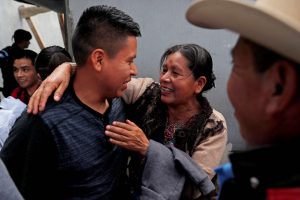Guatemala City, Jul 16 (efe-epa).- A total of 241 Guatemalan migrants returned to Guatemala City on Tuesday after being deported from the United States on two flights, displaying signs and complaining of mistreatment in the US shelters where they said there was not enough food, no attention to basic needs and little water.
The returning migrants emerged one by one, sometimes after lengthy delays, from a narrow corridor along the side of a guarded building after disembarking from the Guatemalan air force planes and were finally welcomed by their relatives, trying to dodge reporters and exchanging US dollars or Mexican pesos into Guatemalan currency.

Some of the migrants still had to travel on Foreign Ministry buses another 236 kilometers (146 miles) to Huehuetenango, where the majority of them lived before departing on their trek to the US to try and partake of the American Dream.
But their dreams of getting a new start in life and improving their economic prospects was clouded by their detentions when they got to the US border or were nabbed by the US Border Patrol.
Many of them compared the detention centers to concentration camps.
A 50-year-old capital resident who lived in Boston for 14 years, where he worked in construction, told EFE that shelter staff did not give him and his fellow detainees enough food and he was mistreated by US authorities.
“They gave us a little burrito with beans at every meal, first at 7 am, then at noon and finally at 11 pm. Then, they told us that if we wanted water we had to get it from the tap in the washroom that was in the cage,” he said before getting into a taxi with his wife, who had come to pick him up.
In Boston, he was detained a few weeks before being transported to Miami, where he was held for two months. He had to sleep on the floor, experiencing cold, fever and seeing how the shelter became more and more crowded without “any kind of control,” he said.
A woman carrying a one-year-old infant named Osaias anxiously awaited her husband Kevin while trying unsuccessfully to get the baby to eat white rice with tomato sauce. After a couple of hours, she saw her husband emerge from the corridor.
“I don’t have much to say,” said Kevin, his throat tight with emotion as he smiled with Osaias in his arms. “I’m a little emotional and tired.”
The mother of another man who lived for 13 years in Texas cried while she held onto his arm. “The situation in the detention centers is terrible. They treat us like dogs,” he said.
Similar comments came from another young man as he moved away from the crush of people to the buses for the trip to Huehuetenango. “To be detained there (in Louisiana) is the worst thing I’ve ever experienced and if I could tell people not to go, that’s the best I could do now and no, I don’t want to return,” he said.
Another woman did not hide her smile during her long wait to see her son, who she had not seen for 14 years. A few weeks ago, she had been able to hug another son, who US authorities deported first, despite the fact that both had been detained at the same time while they were going to work in Miami.
Bricklayers originally from the town of Malacatancito, they had managed to live and work in the US for almost 15 years until this past May when they were apprehended and transferred to detention centers.
The man’s mother said that she felt “sad that they returned,” but “at the same time happy to be able to see him.”
Selvin Gomez, accompanied by his grandfather Alberto Tabla to pick up his 18-year-old cousin Daniel Ramirez, who was deported on Tuesday, told EFE: “I haven’t seen him for a long time, although he just left for the States, but since I work on a coffee plantation I wasn’t in the capital, which is where the whole family lives.”
With the two flights from the US on Tuesday, one carrying 135 deported migrants and the other 106, a total of 31,424 people have now been returned to Guatemala so far this year, in addition to the 30,138 returned in 2018, 16,273 in 2017 and 18,675 in 2016.
